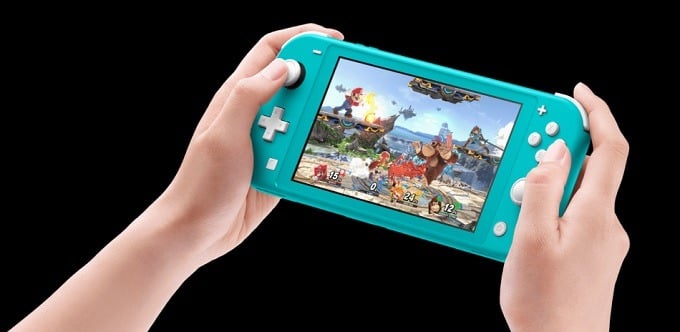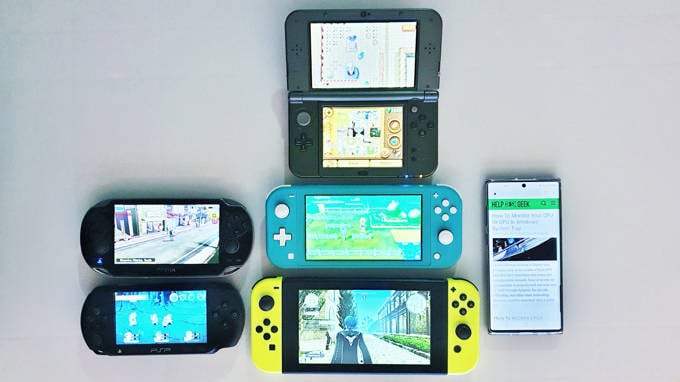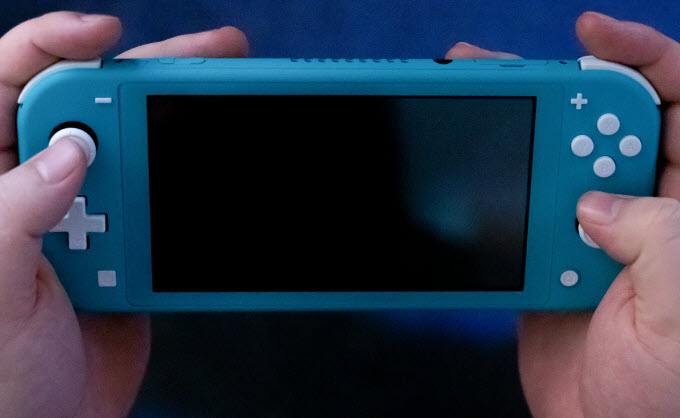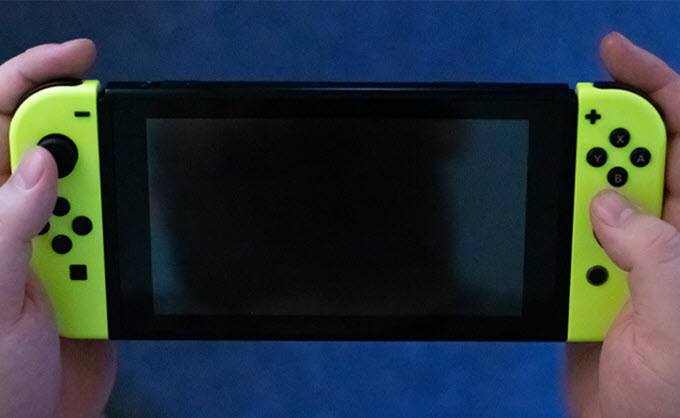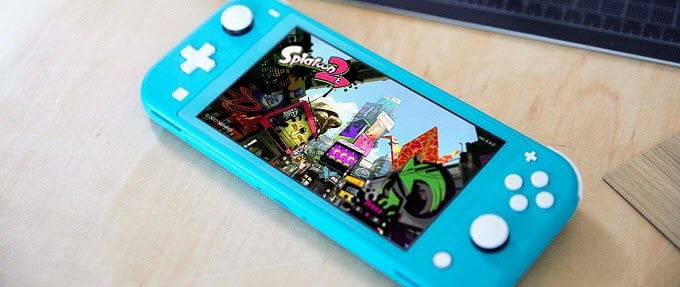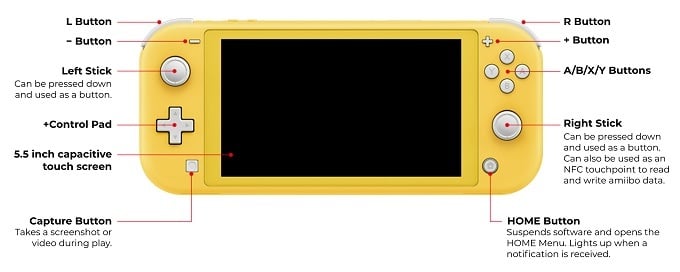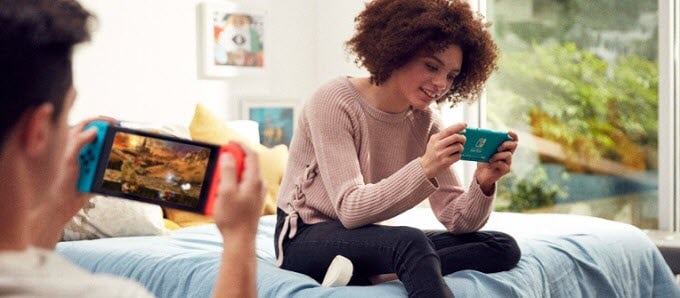The Switch might be only a little more powerful than the PS3 and Xbox 360, but by squeezing that power into a handheld-form factor and showering us with quality exclusives and ports, it’s become a game changer. The original Nintendo Switch was a breath of fresh air, but it does have some niggles. For one thing, it’s absolutely massive as a handheld console. Coming from the 3DS and Vita, a Switch isn’t nearly as portable. It’s only “pocketable” to the sorts of people who wear trench coats year-round. Unless you’re Paddington Bear or Neo from The Matrix, that’s a potential deal-breaker for many handheld gamers. Now, we finally have our hands on the new Nintendo Switch Lite, a handheld-only device aimed squarely at 3DS fans looking for a proper successor to the fantastic foldable console from the last generation. If you’ve been on the fence between the original Switch and this new “Lite” model, it’s time to compare them in the ways that really matter.
Nintendo Switch Lite: It’s Smaller Than It Looks
The first thing you should know about the Nintendo Switch Lite is that it’s probably smaller than you think! In the image above the Switch Lite (center) sits next to several other handhelds. Directly below is the original Switch console. To its left, a Sony PS Vita and PSP Street. Above it, a New 3DS XL and to its right the Samsung Note 10+ smartphone. The marketing materials released prior to the console launch can be a little misleading. On paper the 6.2” Switch screen doesn’t seem much bigger than the 5.5” unit on the Lite, but in reality it’s tiny. It’s closer to the Sony Playstation Vita in overall size than the original Switch. Our Vita unit is the launch OLED model, and it feels heavier and thicker in comparison to the Switch Lite. Nintendo has managed to squeeze most of the original Nintendo Switch hardware into an incredibly tiny space and the Lite is actually pocketable, although still not as convenient as a New 3DS XL. It can be stuffed in your trousers without a protective case thanks to the clamshell design. If you really want to use your Lite in the same way as you could with the 3DS, we strongly recommend a screen protector and perhaps a silicon skin or snap-on hard case. After all, you won’t find Gorilla Glass here.
It’s All About The Handling
The radically smaller size of the Lite has a huge effect on ergonomics. It’s much less tiring to hold for long periods of time. The original Switch requires a pinch grip for many users with smaller hands, which can lead to cramps. The Lite is small enough to rest easily in the palms of your hands. There’s no need to actively grip it to play. The buttons are also revamped compared to the traditional Joycons. The face buttons are softer, rather than hard and clicky as in the past. We now also have a proper D-Pad and it feels pretty great. The texture of the case plastics and the analogue sticks are all a general improvement over the original model. As the Lite is so much less weighty, it might feel flimsier at first, but in reality this is a very solid console with no perceptible flex during normal play.
A Mixed Display
The 5.5” display on the Nintendo Switch Lite is bright and crisp, with vibrant color reproduction. Since it has the same 720p resolution as the original Switch at a smaller size, the pixel density is better. It’s definitely noticeable side-by-side and games look fantastic on the little console. However, some players may end up holding that screen a little closer to their faces. Games with text and interface elements optimized for the 6.2” screen can sometimes lead to a bit of mild squinting. Many Switch games tweak their user interface between docked and handheld mode, it would be nice to see a third mode for the Lite that pumps up text size a little when needed. The only real sacrifice here is size and, compared to our original Switch, the Lite’s screen is a nice overall improvement. Although it’s not worth throwing your old Switch in the bin for. If you really want to blow your mind, put the Nintendo Switch Lite down next to the New Nintendo 3DS XL. The screen from Nintendo’s previous generation handheld literally pales in comparison. We loaded Pokemon X on the 3DS and compared it to Pokemon Let’s Go Eevee on the Switch Lite. The detail, brightness and color are in an entirely different universes.
Trimming More Than Just The Fat
Of course, not everything you can enjoy on the Switch is present on the Switch Lite. HD rumble is a sad omission. However, you can connect an existing set of wireless JoyCons and use them as usual. However, given the small screen size, it’s not a practical solution. So you can cross any games that need the Joycons off the list. If you are, however, a masochist, you could always use a charging stand. This Switch also doesn’t actually Switch. It should be obvious but, in case anyone is wondering, there is no way at all to hook this up to a television. It’s handheld-only. The battery is smaller, but then this is running on a newer, much more efficient chipset. A Pokemon marathon typically gave us about five hours of play at moderate brightness, so between 30 and 60 minutes more compared to the original Switch. However, do bear in mind that a revision of the big Switch is out that uses the same efficient chip and has a bigger battery. Beating both of the other options handily. If you’re a power bank warrior this is a moot point.
Who Should Buy a Nintendo Switch Lite?
Is the Switch Lite a good console? It’s probably the best pure handheld on the market today from a hardware point of view. It’s also the cheapest way to get access to the incredibly Switch library of games. That said, it’s not for everyone. This is who we think the Switch is best suited for:
Someone who doesn’t own a Switch and only wants to play in handheld mode.A second Switch for a spouse or child.Players with small hands or who have issues with the size and weight of the original Switch.
The one use case the Switch Lite isn’t really suited for is as a second Switch to one you already own. It’s tempting to buy it as a travel-specific model. However Nintendo’s online cloud services and game licencing is set up in such a way that the whole notion is impractical. Unless you only buy physical Switch games and can put up with the clunky local game save transfer method, the Nintendo Switch Lite simply isn’t a companion to its larger sibling. In all other ways, it’s the true successor to the handheld gaming crown.
